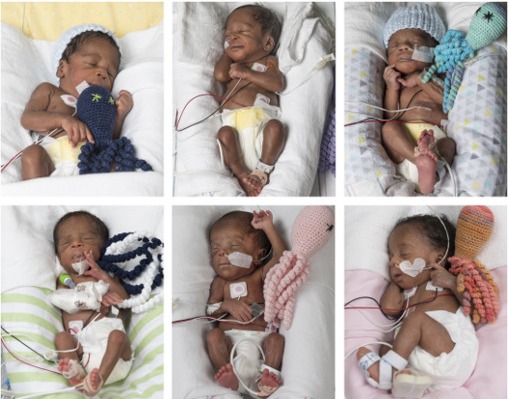-
Delivered by a 40-man medical team

One, two, three, four, five, six … a Nigerian woman has delivered a set of sextuplets in a US hospital after 17 years of marriage without a child.
The sextuplets were successfully delivered at the Virginia Commonwealth University (VCU) Medical Centre, Richmond,USA.
The woman, Ajibola Taiwo, was 30 weeks and two days pregnant when she gave birth to the three boys and three girls by cesarean section. The babies ranged in weight from 1 pound, 10 ounces to 2 pounds, 15 ounces. All six are reportedly doing well and continue to thrive in the VCU neonatal intensive care unit.
The couple, Adeboye and Ajibola Taiwo, who had tried to conceive for 17 years were overcome with joy when their first ultrasound in November 2016 revealed four heartbeats. The story however changed in January when they arrived at VCU Medical Center and discovered they were actually expecting sextuplets.
“I was excited. For the very first time we were expecting,” Adeboye said.


A 40-man medical team which included experts from maternal-foetal medicine, labour and delivery, nursing, anaesthesia, respiratory, neonatal medicine, social work, nutrition, cardiology and chaplain services, helped to deliver the babies in the morning of May 11, 2017.
According to the US Centre for Disease Control and Prevention, in 2015 there were nearly 4 million live births in the United States, only 24 of which were quintuplets or other higher order births.
Delivering sextuplets requires a coordinated team effort including many hours of planning and simulation. The Taiwos’ medical team included experts from maternal-foetal medicine, labour and delivery, nursing, anaesthesia, respiratory, neonatal medicine, social work, nutrition, cardiology and chaplain services.
“The team quickly assembled to begin prenatal management and delivery planning including pre-delivery drills and resuscitation exercises,” said Susan Lanni, M.D., medical director of labour and delivery and maternal-foetal specialist at VCU Medical Centre.
“A typical labour and delivery shift includes one, perhaps two premature births, usually with time in between. We had to coordinate with our colleagues in the NICU for six premature babies to be delivered simultaneously.”
Developing a relationship with the mother and father was a critical component to the successful high-risk delivery.
“We’re going through this extraordinary journey together with the family,” said Ronald Ramus, M.D., director of the Division of Maternal-Foetal Medicine at VCU Medical Centre.
“It’s not every day that parents bring home sextuplets. Mrs. Taiwo was eating, sleeping and breathing for seven. A lot of the support and encouragement we gave her to make it as far as she did was important, and one of the biggest contributions we made as a team.”
Adeboye Taiwo said everyone performed beyond his expectations from the time they arrived at VCU Medical Centre.
“The medical team is excellent in medicine and hospitality,” he said. “We are far from home but the medical team is our family. That is what got us this far.”

Ajibola Taiwo was discharged from the hospital May 18. She and her husband actively participate in the sextuplets’ care in the NICU.
“This is an amazing medical accomplishment that would not be possible without the outstanding coordination of our obstetrics and neonatal teams,” said Russell Moores M.D., medical director of the Neonatal Intensive Care Unit at Children’s Hospital of Richmond at VCU.
“While our level 4 NICU cares for the region’s most critically ill and premature babies every day, it’s humbling to help the Taiwos’ new family survive and thrive. Given their prematurity, they are doing exceptionally well, but should they require sub-speciality care, we have all that they could need at CHoR.”
“I hope for the smallest of my six children to grow up and say ‘I was so small, and look at me now,’” said Ajibola Taiwo. “I want my kids [to] come back to VCU to study and learn to care for others with the same people who cared for me and my family.”
Courtesy: VCU News

